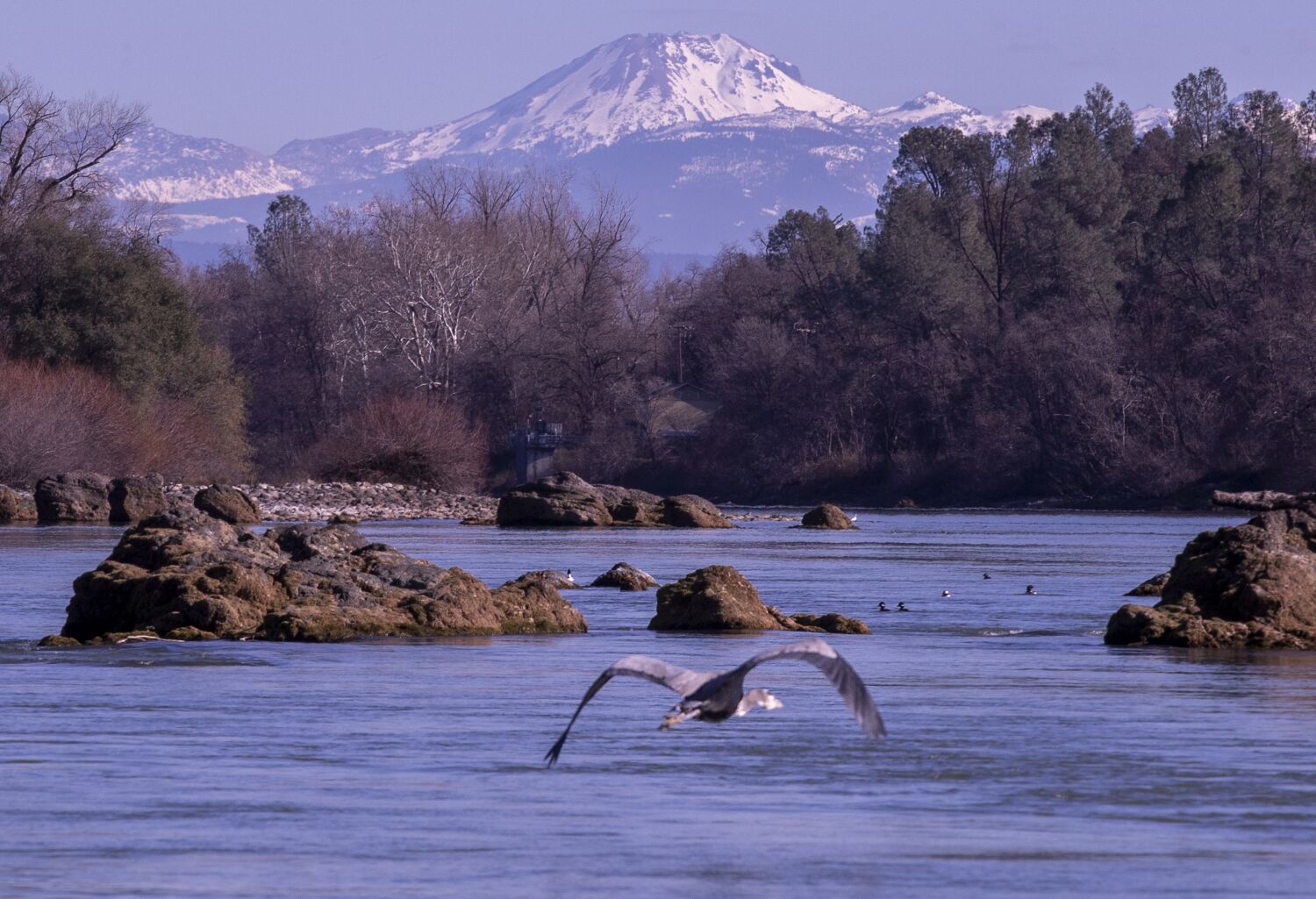Global Courant 2023-05-04 17:00:58
A California tribe has signed agreements with state and federal agencies to collaborate on efforts to return endangered Chinook salmon to their traditional spawning grounds upstream from the Shasta Dam, a deal that undermines tribal leaders’ long-standing goal of getting transplanted fish reintroducing could promote. from California to New Zealand over a century ago and still thrive there.
Members of the Winnemem Wintu tribe have long tried to restore a wild salmon population in the McCloud River north of Redding, where their ancestors once lived. The agreements, first signed this week, formally recognize the tribe as a partner participating in efforts to save the endangered winter-raised Chinook salmon.
Caleen Sisk, leader and spiritual leader of the Winnemem Wintu tribe, discusses why she and other tribe members want to bring salmon from New Zealand to reintroduce the fish to the McCloud River.
(Allen J. Schaben / Los Angeles Times)
“We are very hopeful,” said Caleen Sisk, the tribe’s leader and spiritual leader. “It allows us to have a bigger voice in the process of bringing back the salmon.”
She said state and federal officials “realized they really need to have us as partners.”
“I think it takes everyone’s knowledge to really get them to recover,” Sisk said.
She signed the agreements Monday with state and federal fisheries officials at a ceremony next to Shasta Lake, near where the McCloud River empties into the reservoir. After the signing was completed, members of the Winnemem Wintu and Pomo tribes danced around a fire.
Chinook salmon have not been able to reach the McCloud River since 1942, when construction of the Shasta Dam blocked the fish from swimming upstream in the Sacramento River and closed off their spawning grounds, causing population declines.
A view of the Shasta Dam.
(Allen J. Schaben / Los Angeles Times)
The past three years of extreme drought have taken an increasing toll on endangered winter salmon. At times, the water of the Sacramento River downstream from the Shasta Dam has warmed to a point that is lethal to salmon eggs.
Last year, the fish experienced their worst spawning season on record. Recent rainfall and snow have boosted Lake Shasta to 98% of full capacity, promising better conditions for salmon this year. But the Chinook still faces major threats as global warming leads to more intense droughts.
Scientists have also found that California salmon suffer in part from thiamine deficiency, which they suspect is caused by fish overfeeding on anchovies, which grow in abundance along the coast.
Chinook salmon is central to the cultural and spiritual traditions of the Winnemem Wintu tribe. They call salmon Nur.
The McCloud River is at the heart of their traditional homeland, which the tribe lost when the reservoir filled up.
For years, the tribe has advocated an approach to salmon reintroduction that would involve developing a “swim lane” to allow fish to travel upstream and downstream around the Shasta Dam.
A display of winter-run Chinook salmon eggs before hatching at Livingston Stone National Fish Hatchery.
(Kaitlin Dunham / U.S. Fish and Wildlife Service / Los Angeles Times)
The tribe also wants to use eggs from Chinook salmon that were transplanted to New Zealand more than a century ago. Sisk said she and others believe that because these fish are wild and adapted to swim up mountain streams, they are better suited to the conditions of the McCloud River than other fish raised in California hatcheries.
Below the agreements, state and federal agencies pledged to study the possible reintroduction of Chinook from New Zealand. The agreements also call for an analysis of the feasibility of building a fish pass that would allow salmon to travel around the dam.
Without that kind of passage, Sisk said, “we know there’s no point in bringing New Zealand salmon back or putting salmon on the McCloud.”
“This is the only way those salmon can recover their numbers,” she said.
Biologists track the populations of several species of salmon in the Sacramento River, each named for the season in which they return from the Pacific. In addition to the endangered winter-run Chinook, there is the spring-run Chinook, which is listed as endangered under the Endangered Species Act.
The most numerous are the fall and late fall Chinook, which support commercial and recreational fisheries. But this year, regulators decided to halt the fishing season along California’s coast for the second time in history due to the major decline in salmon populations.
A fall-walking Chinook salmon swims in a pond at Coleman National Fish Hatchery.
(Allen J. Schaben / Los Angeles Times)
The California Department of Fish and Wildlife and NOAA Fisheries agreed to include the tribe as an “equal” in decisions about efforts to rebuild the salmon population. The tribe has agreed to share traditional ecological knowledge, just as their ancestors once did for fishing expert Livingston Stone, who first Chinook salmon farm on the McCloud River in 1872.
The State Department of Fish and Wildlife also provided a $2.3 million grant to support the tribe’s efforts.
Chuck Bonham, the director of the department, said the “co-management” agreement is a long time coming.
“We cannot change the mistakes made in the past, but we have a duty in the present to make it better,” Bonham said. “With this agreement, we are bringing life back to the McCloud River.”
The tribe’s “co-stewardship” with NOAA Fisheries came about “as we collectively identified both the risk to the remaining population, but also the opportunities we had to really collaborate and chart a new course for the recovery of salmon,” said Cathy Marcinkevage, assistant regional administrator for the agency.
Last year, tribe members teamed up with state and federal biologists on an experimental project on the McCloud River that released thousands of young winter salmon taken from a nearby hatchery. By mid-December, more than 1,600 of the fish had been recaptured, loaded into aerated coolers, and transported downstream from the dam, where they were released to continue their journey.
State officials have also been there test a system for catching young salmon in Lake Shasta.
A decision has yet to be made on plans for this year, but the new agreements “give us more confidence that we can make a similar concerted effort this year to move the winter run back to the McCloud,” said Michael Milstein, a spokesman from NOAA Fisheries.
The agreements provide an example of how government agencies should work with Indigenous leaders to restore ecosystems, said Daniel Cordalis, co-director of Ridges to Riffles, an Indigenous conservation group.
Caleen Sisk, leader and spiritual leader of the Winnemem Wintu tribe, scans a creek for signs of salmon. .
(Allen J. Schaben / Los Angeles Times)
“We think a lot of recovery work can and should be done with the support of the indigenous communities that are there,” Cordalis said. “They have as part of all these restoration projects, and having their voice to be a part of it is extremely important to the longevity and sustainability of restoration.”
Sisk said the willingness of government officials to take in the tribe represents a big change.
“They actually let us sit at the table. They used to not even let us sit on the steering committee,” she said.
Sisk said she hopes to be able to reintroduce fish from the New Zealand population within three years.
“We have to think creatively,” she said.
Sisk said she hopes the government’s biologists will focus on studying how to “keep the fish wild” to help them survive. She said she also hopes that once the salmon return to the McCloud River, the 126 members of the tribe will also be able to regain a home and thrive along the river.
“We believe that whatever happens to the salmon will happen to us,” she said.








